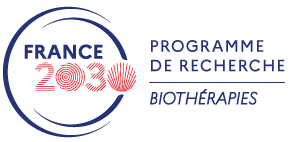La série de webinaire Thursday Lunch Talks a pour objectif d’explorer les dernières innovations françaises en matière de thérapie cellulaire et génique et de bioproduction.
A destination des scientifiques académiques et industriels, ces sessions se focalisent sur les avancées qui façonnent l’avenir des biothérapies en France.
Gene therapy for drug-resistant temporal lobe epilepsy
Temporal lobe epilepsy is characterized by recurrent seizures generated in the limbic system, particularly in the hippocampus. In a large number of patients suffering from mesial temporal lobe epilepsy (mTLE), anti-epileptic therapy regimens fail to decrease seizures, leaving surgical ablation as the only therapeutic option to potentially reach seizure freedom. Here I will present a collaborative translational project which has identified the kainate receptor (KAR) subunit GluK2 as a promising target for the treatment of mTLE using gene therapy. In mTLE, recurrent mossy fiber sprouting from dentate gyrus granule cells (DGCs) create an aberrant epileptogenic network between DGCs which operates via ectopically expressed GluK2/GluK5-containing KARs. We have shown that intra-hippocampal delivery of an AAV vector which downregulates grik2 mRNA in a mouse model of mTLE significantly reduced daily seizure frequency. In these mice, the treatment also improved health status, reduced their anxiety, and restored cognitive deficits. In addition, transduction of hippocampal organotypic slices from patients with mTLE reduced levels of GluK2 protein and, most importantly, significantly reduced interictal discharges. Overal our results provide proof-of-concept for a gene therapy approach targeting GluK2 KARs for drug-resistant TLE patients.

